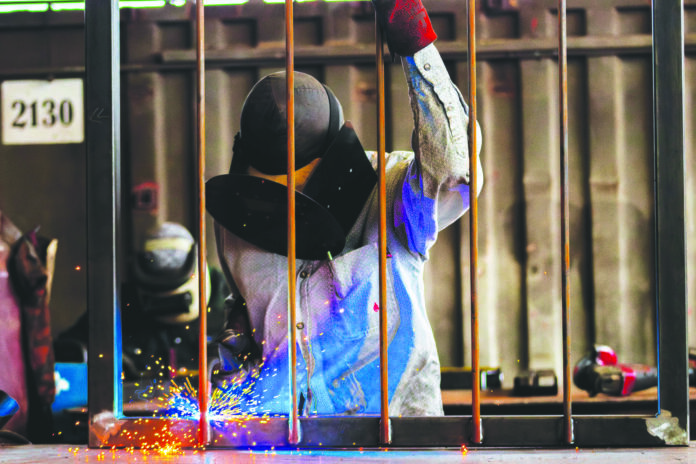This offsite niche is multifaceted. The four companies profiled here illustrate the variety of markets it can serve.
- Companies serving this part of the offsite world build everything from storage containers to ADUs, to portable bathrooms, hotel rooms and hunting lodges.
- Adaptability is a hallmark of the four companies profiled here. Each began with a specific market focus then expanded to serve new customers.
- Although codes have caught up with the container business, the rapid growth of this market has included some shoddy output. The best way for a company to stand out is to offer a high-quality product.
To take the pulse of the offsite industry’s container modification sector — that is, companies that modify shipping containers into homes, offices and other uses — we decided to check in with four different players: S.I. Container Builds, Cascade Container, Falcon Structures, and XCaliber Container.
These companies are located in different areas of the country and are at different stages of their growth. Each started with a particular focus then pivoted to serve other customer segments. They illustrate the ways in which this industry has been developing, and what opportunities are available. Company representatives share their thoughts on where they think the container business is going.
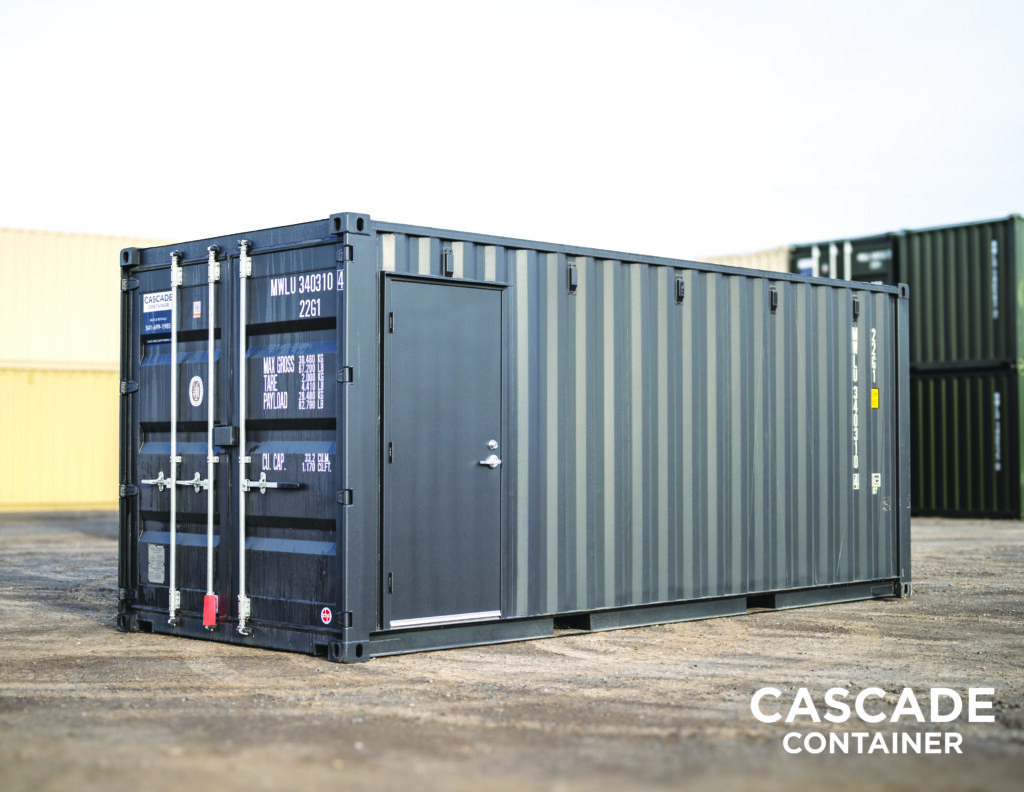
Image courtesy of: Cascade Container
Serving Business Customers
S.I. Container Builds was founded in 2018 and is based in Buffalo Grove, a suburb of northwest Chicago, Illinois. The founders knew they “wanted to repurpose shipping containers, because we didn’t like these wonderful steel structures going to waste,” according to Rory Rubin, Co-Founder and CEO.
Rubin notes that if containers aren’t repurposed, they go to a container graveyard. “We don’t send them back to China because it’s cheaper for China to make new ones,” she says.
Initially, the company built custom single-family homes on-site, using shipping containers as the starting point. “We evolved into doing the work in our factory. And we’re now focused more on multifamily units, wellness spaces and ADUs for developers,” Rubin says.
At this point, they’re entirely focused on selling to businesses, non-profits and other organizations — rather than to individual consumers. Rubin says that selling custom containers to individuals isn’t a realistic business model in the US. Although the company is licensed in the 50 states, and although repurposed containers have been certified in the ICC codes, “each municipality can chime in on how they want things built.”
In 2024, S.I. Container Builds hired a consultant to help “convert our factory from a warehouse — what I’d call a job shop — into a big, scalable factory. We restructured everything for efficiency and cost savings to reach our goal of producing one module every day. That’s been a huge development for us.”
That greater efficiency is helpful as the company works on larger projects. They’re currently making a two-story amenities building for the Navy Pier in Chicago. Next in the pipeline are a 6,400 sq. ft. group home for girls who have been victims of trafficking, followed by their first home for Habitat for Humanity.
Rubin still spends approximately 80% of her time educating people on the value of converting containers, an effort that seems to be bearing fruit. Overall, she says, “I do think it’s getting easier.” However, she does have to explain that containers are not rusty old boxes and are not going to be too hot or too cold. “They can be used in the mountains, and they can be used in Florida.”
Another helpful fact when it comes to making the case for containers is that while some people appreciate the industrial aesthetic, that can be altered. In fact, she says that a container-based structure can be detailed to fit into any community. “We’ve cladded them with everything from Hardie board to faux brick to log cabin [façades].”
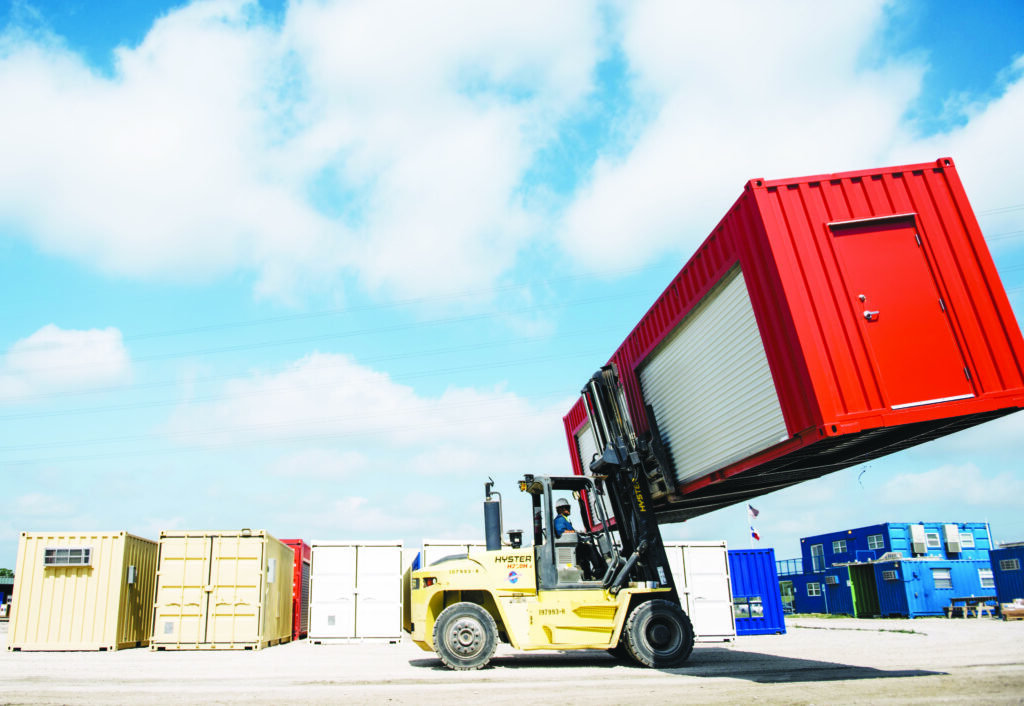
Image courtesy of: Falcon Structures
Adaptability Needed
Cole Davis founded Cascade Container in 2020 in Bend, Oregon. The company sells and rents containers for temporary storage and also sells “container modifications such as roll-up doors, windows, man doors, insulation and full office conversions.” They have delivered modified containers for office spaces, home storage and jobsites.
Although container modifications are now a core part of Cascade’s business, that wasn’t the case when the company first launched. “Our custom builds have grown as demand for tailored solutions increases,” says Davis. “Customers love the ability to customize their containers —whether for mobile offices, insulated storage or climate-controlled spaces for unique applications.”
The company has also moved into offering specialized refrigerated containers for sale or rent. They’ve had to expand their team to keep up with demand, “adding specialists in logistics, modifications and customer support.”
Davis says there’s a growing trend of using modified containers for home offices and backyard suites. Cascade Container is even “developing a shipping container home gym for customers who want a private workout space in a compact footprint.”
He says that the market has been unpredictable over the last few years, with container prices surging during COVID-19, then stabilizing later. He adds that future pricing may be affected by trade issues. “With ongoing trade wars and supply chain disruptions, market conditions remain uncertain. That’s why we focus on staying adaptable — whether through storage solutions, modifications, or new container applications.”
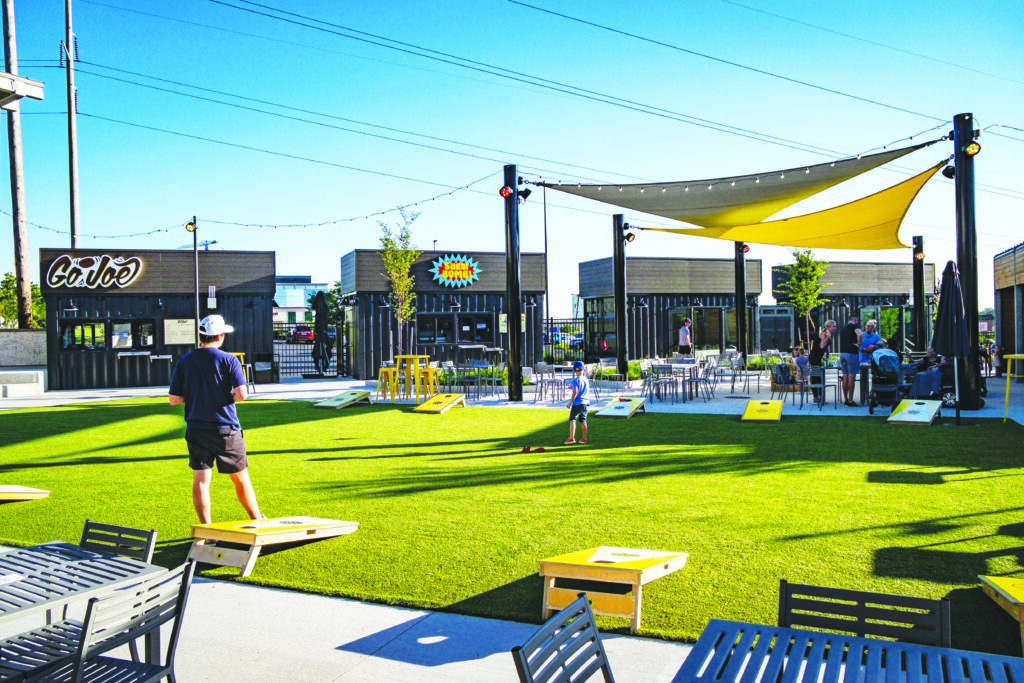
Image courtesy of: Falcon Structures
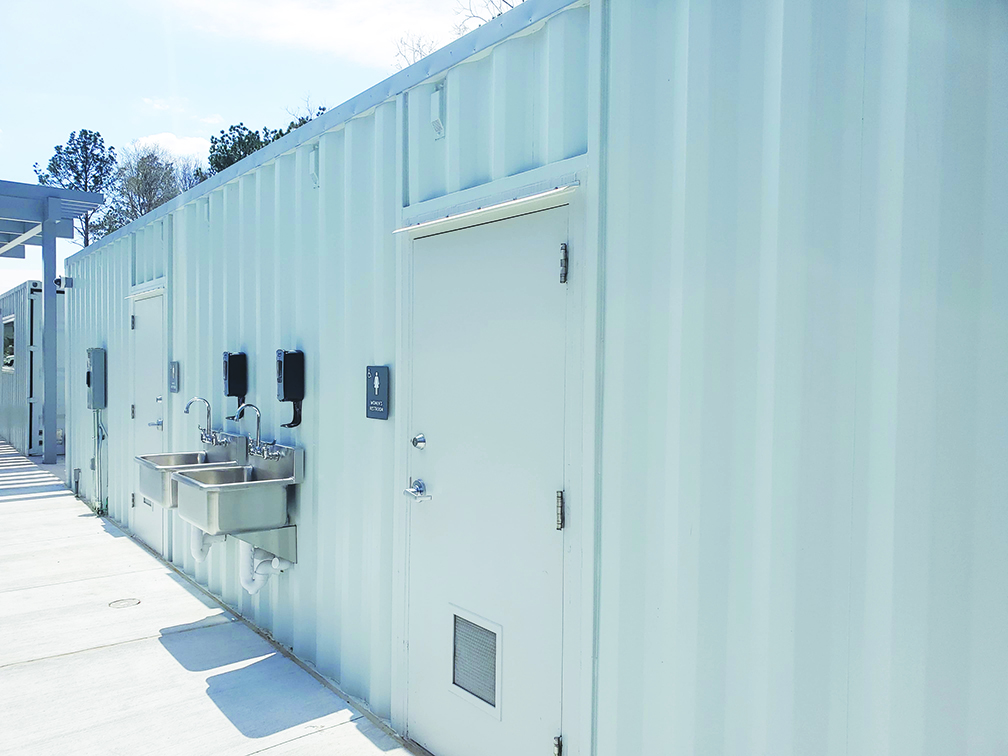
Image courtesy of: Falcon Structures
Shopping and Construction
Based in Manor, Texas, Falcon Structures has been around for over 20 years. It was founded in 2003 and, like the other companies featured here, has changed over time to keep up with evolving demands in the container modification industry.
“Back then, using containers as buildings — even temporary ones — was pretty much unheard of,” says Stephen Shang, Co-Founder and CEO. “At first we were all about portable storage,” which mostly consisted of renting containers to construction companies for secure site storage of tools and materials. In fact, the company was initially named Falcon Storage.
That focus quickly expanded. Within a year of its founding, Shang and his team began modifying containers on a very small scale. “We were five guys — including me — huddled around a container cutting holes in it, trying to figure things out,” he recalls.
When the recession hit in 2008, “we needed to find other ways to use our containers, because construction screeched to a halt,” says Shang. After working with the US Department of Defense on simulated Iraqi towns for troop training, complete with houses, mosques and schools all made from containers, the company realized that a lot of different industries could use their product. “So, we broadened our customer base and became much more of a manufacturer at that point.”
In recent years, the company has completed some large permanent buildings. These include a shopping complex in Rio Rancho, New Mexico; an entertainment complex in Overland Park, Kansas; and a stadium to host lacrosse games and community festivals in Obetz, a suburb of Columbus, Ohio.
Recently, they’ve moved into a new niche that’s dear to Shang’s heart — providing buildings that improve conditions for blue collar workers. These include proper bathrooms with flushable toilets and running water for handwashing, break rooms with air conditioning and change rooms and shower facilities. They’re selling them primarily to construction and manufacturing companies.
Shang says that a container company such as his is easier to start than a conventional modular manufacturer. The latter requires “a bunch of capital investment to get factory space, buy materials and set up a supply chain.” In contrast, “Modifying containers has lower barriers to entry. A couple of guys who want to start a business can go to a port, buy some containers, transport them and cut some holes in them to get started,” Shang says.
The industry has also matured. In the past, says Shang, ease of entry led to what he calls a “Wild West attitude” where many people ignored permitting and building codes. But that’s no longer the case. “The market demanded a [regulatory] framework for buildings made from modified containers. There were players like us, as well as the Modular Building Institute, pushing for codes to regulate the industry. We collaborated with ICC, and it actually happened pretty quickly,” he says. As a result, “The people who didn’t want to follow building codes faded away.”
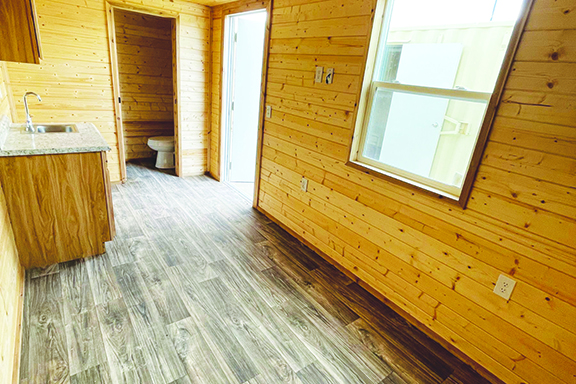
Image courtesy of: XCaliber Container
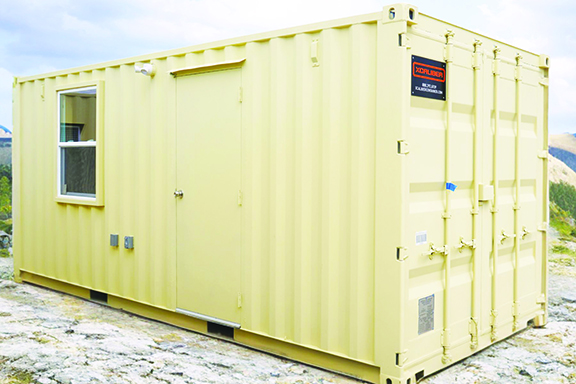
Image courtesy of: XCaliber Container
Due Diligence Needed
Headquartered in Graham, Texas, XCaliber Container was founded in 2014. XCaliber started by custom-modifying shipping containers for a variety of uses, including speciality storage (roll up doors, climate control, etc.), mobile offices and cabins. These days, in addition to custom modifications, the company sells unmodified containers for storage and other uses.
“We maintain a selection of turnkey, in-stock units,” says Nomar Cabello, XCaliber President. “We also work with individual customers to create unique, custom container cabins for hunting leases, guest accommodations and more.” Recent customers have included Cape Lookout National Seashore in North Carolina, and the Ritz-Carlton, Cabello says.
They offer a variety of add-ons for customers to choose from. These include interior shelving, rooftop decks, vents, awnings, spray foam insulation, an electrical package and various doors and windows.
The company’s facility spans over 20 acres. Cabello says, “We have the capacity to fulfill bulk orders and produce private-label fleets, providing customized solutions for businesses of all sizes.” Currently, the company is fulfilling large-volume orders for ground-level office spaces.
Cabello notes that that the container sector has grown in recent years. He believes that people will continue to find new uses for shipping containers, and that demand for them will grow across various industries.
But growth has also spawned a problem that he describes as “a noticeable decline in quality across the industry.” Because of this, he recommends that customers perform a lot of due diligence on the container conversion companies they’re thinking of doing business with. When it comes to XCaliber, Cabello welcomes such scrutiny. “We have a loyal customer base, with many returning time and time again.”
Zena Ryder writes about construction and robotics for businesses, magazines, and websites. Find her at zenafreelancewriter.com


